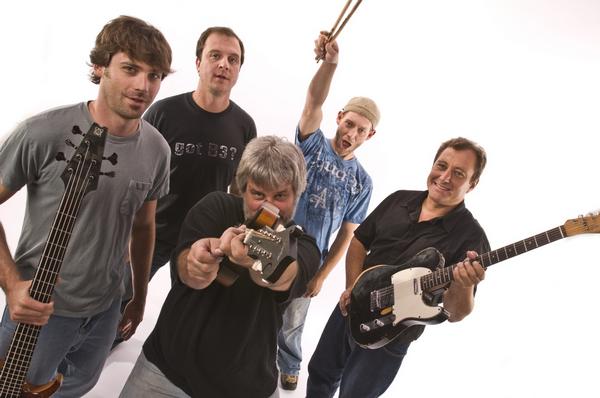Great American Taxi (from left, Edwin Huritz, Chad Staehly, Vince Herman, Chris Sheldon and Jim Lewin): Sharing tall tales, good times and a smidgen of heartbreakWhen It’s Right, It’s Flat Right
By David McGee
RECKLESS HABITS
Great American Taxi
Great American Taxi RecordsNot heard from on record since its 2007 self-titled debut, Great American Taxi has been heard plenty on the jam band circuit, where the quintet has become a fan favorite. Purveying a stylistic mesh of bluegrass, traditional country, blues and shambling, wild ‘n’ woolly rock ‘n’ roll, the band is arguably the most direct link to the roots music sensibility promulgated first and foremost in the late ‘60s-early ‘70s by the likes of the Dead, Old & In the Way, New Riders of the Purple Sage, Gram Parsons, the Flying Burrito Brothers and the Gram Parsons-Clarence White-era Byrds. Working with producer Tim Carbone (Railroad Earth), the fellows have made their return a moment to celebrate fine songwriting, inspired playing, personable singing, a warm, welcoming spirit and the sheer joy of sharing tall tales, good times and a smidgen of heartbreak with fans new and old.
Founding members Vince Herman (late of Leftover Salmon, on guitar and vocals) and Chad Staehly (keyboards and vocals) direct guitarist Jim Lewin, bassist Edwin Huritz and drummer Chris Sheldon on an infectious romp through 14 exemplary tunes amounting to nearly an hour’s worth of stirring listening that demands repeat visits by dint of feeling so darn right. Fans of the jam band GAT get their money’s worth on three songs of more than six minutes’ duration each (“Unpromised Land,” “Cold Lonely Town,” “American Beauty”) that allow for full and free expression of varied musical and lyrical ideas bolstered by striking sonic textures provided by snarling, psychedelicized guitars and a stirring female gospel chorus (consider “Cold Lonely Town,” which rises from a laid-back, bluesy ditty to a soaring, roiling maelstrom of declaiming voices and apocalyptic guitars). “American Beauty” is not the Dead classic but rather Staehly’s like-titled musing that honors the Dead in its name and in its composer’s husky, nasally, Garcia-like voice, but rambles along in a sturdy country gait reminiscent of the Burritos, especially when guest pedal steel player Barry Sless (arguably this outing’s secret weapon for the energy and intelligence he brings to his every solo) enhances the drive with some Sneaky Pete-like curlicues and swoops along the way.
Great American Taxi performs ‘Fuzzy Little Hippie Girl,’ from its Reckless Habits album, at the Hardly Strictly Bluegrass Festival, San Francisco, CA, 2009But Reckless Habits is no mere exercise in chops and attitude. The heart and soul infusing the original songs hits a listener where he lives every time, and in the end is what makes the album more than the sum of its parts. The epic yearning and grand scale of loss and longing articulated in “New Madrid,” set in a dense, hymn-like soundscape defined by a somber piano and keening pedal steel, is on a par with Gram Parsons’ most anguished outpourings, and as challenging as some of Dylan’s John Wesley Harding tales. The record could have ended right there, after four cuts, and been adjudged by your faithful friend and narrator as one to be reckoned with in the year of our Lord 2010, because “New Madrid” follows the most delightful workout here, a New Orleans-flavored celebration of a typically wise and frolicsome John Hartford treatise, “Get No Better,” complete with funky rhythmic pulse, that female chorus bursting forth in the choruses, a perky horn section (dubbed the Peak to Freak Horns) making its presence felt in true Nola fashion (the trombone, tenor sax and trumpet discourse towards the end is as delightfully playful as it is succinctly stated), and a jaunty vocal that would have Hartford tipping his bowler out of respect for its conjuring of the wry, wise old philosopher’s animating maxim: “Just when you think it can’t get no better than it does/it’s always so much better than it was.” And preceding “Get No Better” the Taxi asserts its topical cred (the band has stood with those opposing mountaintop removal in West Virginia and contributed its original song “Appalachian Soul” to Still Moving Mountains: The Journey Home, a fund raising CD released last year by AuroraLights.org and reviewed here— —in our September 2009 issue) in rocking fashion on “New Millennium Blues,” a driving, rockabilly-influenced cataloguing of woes afflicting common folk arising from the misdeeds of a host of villains from Wall Street to the halls of Congress, on which Lewin’s stinging, protesting lead guitar sorties channel the voices of those oppressed by these shenanigans.
Great American Taxi performs ‘American Beauty,’ from its Reckless Habits album, at the Hardly Strictly Bluegrass Festival, San Francisco, 2009Of course there’s much more than four songs to write home about—try the sprightly western swing lament, “Albuquerque, NM”; the shaggy, smile inducing honky tonker, “Fuzzy Little Hippie Girl,” which doesn’t miss a trick in playing it fast and loose for laughs, from the ramshackle vocal to Sless’s ornate pedal steel solo threatening to go right over the cliff before it comes to an abrupt halt; or, not least of all, the crisp, rollicking, hard driving “Big Sandy River” Bill Monroe instrumental that gives the various players a chance to show off some speed picking of impressive precision and fluency. Welcome back, the door's always open, the light's on, and whatever else it takes to get you to visit more often.
Founder/Publisher/Editor: David McGee
Contributing Editors: Billy Altman, Laura Fissinger, Christopher Hill, Derk Richardson
Logo Design: John Mendelsohn (www.johnmendelsohn.com)
Website Design: Kieran McGee (www.kieranmcgee.com)
Staff Photographers: Audrey Harrod (Louisville, KY; www.flickr.com/audreyharrod), Alicia Zappier (New York)
E-mail: thebluegrassspecial@gmail.com
Mailing Address: David McGee, 201 W. 85 St.—5B, New York, NY 10024



